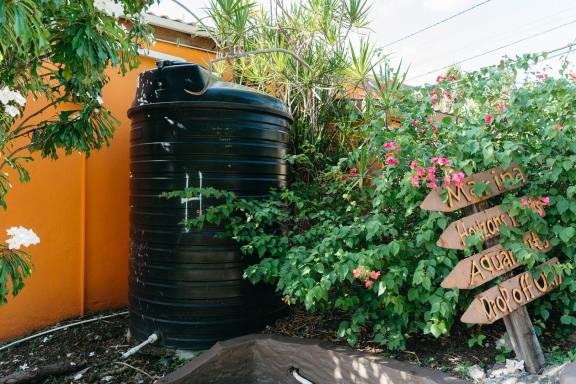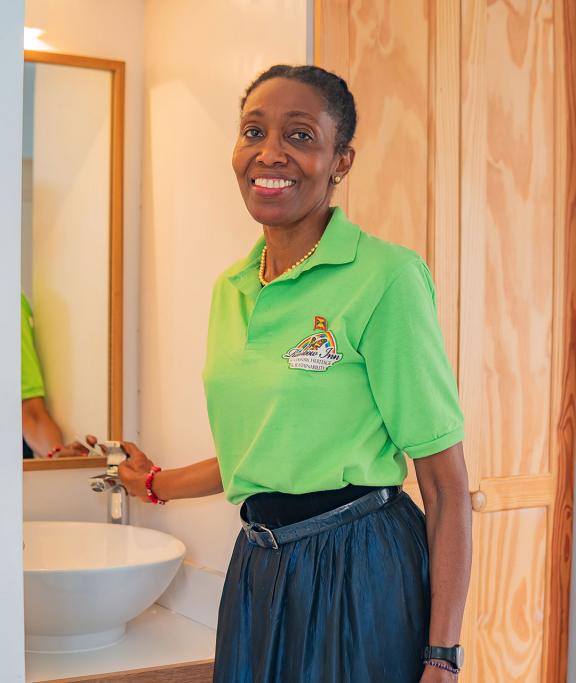Grenada, an island country of the West Indies in the eastern Caribbean Sea has a population of just over 100,000 who largely depend on surface water and rainwater harvesting for its potable water needs. However, climate change is causing higher than average temperatures, unpredictable rainfall patterns droughts, and the intrusion of saltwater into groundwater sources due to sea level rise, exacerbating issues of water scarcity.
Grenada’s top commercial sectors, tourism and agriculture, are both reliant on regular water sources. In the dry season, farmers experience a significant reduction in productivity or are unable to farm. Hotels and guesthouses suffer from unreliable water supply, rationing, water trucking costs and guest dissatisfaction.
In response to the challenges of the Small Island Developing State (SIDS), the Climate Resilient Water Sector in Grenada (G-CREWS) project, funded by the Green Climate Fund (GCF) and implemented by the German development agency, GIZ, strives to bolster water security through the adoption of water-efficient solutions in the agriculture and tourism sectors. The GCF grant will facilitate water auditing, solution design and implementation, and will incentivise significant private co-finance for the purchase of water-efficient equipment.
Greening tourism
Working in partnership with GCF and GIZ, the Grenada Development Bank is spearheading the implementation of a ‘challenge fund’ for tourism under the G-CREWS project. This fund provides two financing options, allowing hotel owners to receive reimbursement of funds up to 80% for bathroom retrofitting with water efficient showers, toilets, and faucets, and the installation or upgrading of rainwater harvesting systems.
Four hotels have already benefited from water-saving devices and rainwater harvesting systems, experiencing both financial and operational gains. Ranging from award-winning boutique hotels to family-focused resorts, they share their experiences and advocate as water-efficient and sustainable tourism role models on the island.
“We have had a 30% reduction in our usage of water, so it has had a major impact on our operating expenses”
In addition to financial saving, Maria Wilson, Point Salines Hotel Manager, says increased water availability during dry seasons improves her customers’ satisfaction.

Maria Wilson, Point Salines Hotel manager says increased water availability during dry seasons improves her customers’ satisfaction. Photo: Communications Unit/GIZ
“I am in awe to see the savings we received as a result of the new Water Sense toilets and sinks.”
Harvesting the rain: a sustainable water solution
Rainwater harvesting systems were installed at The Calabash, Point Saline, and True Blue Bay resort hotels. They consist of roof-water recuperation systems with gutters that are linked with waterpipes to off-the-ground water tanks. The size of the systems installed vary based on the size of the hotel and previously built water storage facilities. Under the project, both the Point Salines and The Calabash installed a 15,000-gallon tank, whilst the True Blue Bay resort installed a 13,400-gallon tank. Together, these installations are generating estimated annual water savings of 7,000 m3.
“With the rainwater catchment programme, we use that water for gardening purposes (…) and for the pools. In our newest block, we use the rainwater for the toilets” says Russ Fielden from the True Blue Bay Resort.

Rainwater harvesting system installed at True Blue Bay resort. Photo: Communications Unit/GIZ
Dr. Dessima Williams, a long-time supporter of sustainable practices in the tourism industry, sees the opportunity given by the challenge fund for tourism as a way to inspire sustainable hotel operations nationwide.
“The challenge fund allowed us to become more sustainable in water management. I am an advocate for getting water conversation as a broad practice and system in the country.”

Dr. Dessima Williams, owner of the Rainbow Inn, shows her newly installed bathroom water saving fixtures. Photo: Communications Unit/GIZ
Delivering hope for agricultural sector amidst water scarcity
The economic repercussions of water scarcity are palpable in Grenada's falling agricultural production, particularly in cocoa, a key export crop. The decline of 57% in cocoa production intensifies Grenada’s reliance on food imports, impacting trade balance and foreign exchange reserves. The trend jeopardises food security and accessibility for low-income citizens, as imported and local food prices escalate due to increased transport costs and declining yields. The G-CREWS project empowers businesses in the agricultural sector, offering up to 100% financing for rainwater harvesting and water efficient installations.
The overwhelming positive response from businesses in the agricultural sector to participate in the challenge fund underscores the urgency of water-related challenges. The surge in demand also reflects the sector's vulnerability to reduced water availability, evident from a sharp decline in the agricultural production.
The project has supported approximately 210 farms across Grenada with suggested new water-smart engineering solutions. The new designs include 120 irrigation systems, 60 shade houses, and 145 river or rainwater harvesting systems. The installation of these water-smart solutions will commence in mid-2024, providing hope to reignite and sustain Grenada’s agricultural production and the lives and livelihoods that depend on them.
The G-CREWS project is a pivotal step toward building climate-resilient economies in Grenada. By addressing water challenges in key sectors, fostering awareness, and supporting innovative solutions, this initiative not only safeguards economic development but also sets a precedent for sustainable practices in the face of climate change.